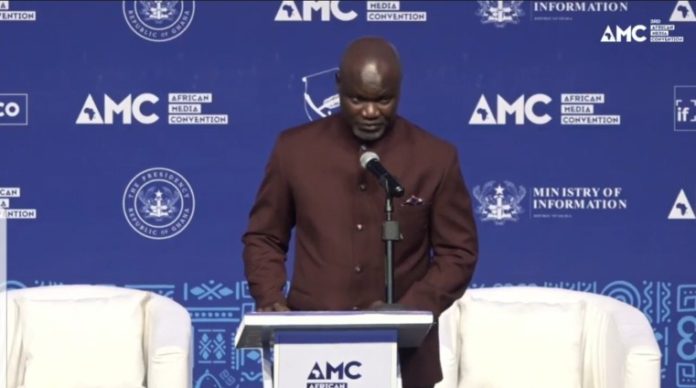The Chairperson of the Africa Media Convention (AMC) Steering Committee and President of The African Editors Forum (Taef), Churchill Otieno, has said that journalism is not and cannot be a crime but rather a noble profession to behold, underscoring the critical role of journalism in Africa.
Otieno emphasized that journalism should be celebrated rather than condemned.
He said this during his address at the 3rd African Media Conference at the Accra International Conference Centre.

Addressing an audience of media professionals, policymakers, and advocates for press freedom, Otieno highlighted the indispensable role that journalists play in fostering transparency, accountability, and democracy across the continent. “Journalism is not a crime; it is a noble profession,” Otieno declared, “We must cherish our journalists and media personnel, not harm or kill them. They are the lifeblood of our democracies and the watchdogs of our societies.”
Otieno’s remarks come at a critical time when many journalists across Africa face increasing threats, harassment, and violence in the course of their work.

The recent years have seen an alarming rise in incidents where journalists have been targeted for exposing corruption, human rights abuses, and other societal ills. This trend, Otieno warned, poses a significant threat to the foundational principles of freedom of expression and the right to information.
“The media and journalists must be celebrated for their important roles on this continent,” Otieno continued. “Without a free and vibrant press, the very essence of our democratic fabric is at risk. We must collectively stand against any attempts to silence our voices or undermine our work.”

The 3rd African Media Convention provided a platform for robust discussions on the challenges and opportunities facing journalism in Africa. Panels and workshops covered a range of topics, from digital transformation in the media industry to strategies for ensuring journalists’ safety and security.
In his closing remarks, Otieno called on governments, civil society, and international organizations to strengthen their commitments to press freedom. He urged for the implementation of stronger legal frameworks to protect journalists and the establishment of support mechanisms for those who come under threat.

“The future of our continent depends on an informed and engaged citizenry,” Churchill Otieno concluded. “And this can only be achieved through a media landscape that is free, fair, and fearless. Let us stand together to safeguard this noble profession and honour those who dedicate their lives to telling the stories that matter.”

Otieno’s impassioned speech is expected to galvanize efforts across Africa to improve the working conditions for journalists and to reinforce the crucial role of a free press in sustaining democracy and development.


